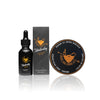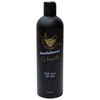Looking to nourish that fine facial hair of yours? Whether you're new to growing or have been working on your face mane for a good while, we've got 2 words for you, buddy - Beard butter.
It's incredibly effective. It's easy to make. And if you want to give your beard the nourishment it deserves, you need it.
In this article, we're going to supply you with the only - and we mean it - only beard butter recipe you need to nourish, hydrate, and promote stronger, faster beard growth.
And after we've covered the recipe (because we're not going to create one of those annoying pages with 2000 words before getting to what you actually want to read), we'll take a look at the benefits you can expect to see from your beard butter, how to use it, and some recommendations for how to take your beard care product to the next level with some home-made fragrances.
So let's get to it.
Beard Butter Recipe: Beard butter nourishes and hydrates the beard, promoting stronger growth. The recipe uses jojoba oil, shea butter, cocoa butter, sweet almond oil, and optional vitamin E and essential oils for fragrance.
Benefits of Beard Butter: It prevents beard itch, softens coarse hairs, and protects facial hair from harsh weather, keeping both the beard and underlying skin healthy.
How to Apply Beard Butter: After washing and drying your beard, apply a small amount of beard butter, work it into the beard and skin, and brush to distribute evenly.
Fragrance Options: You can add essential oils like cedarwood, sandalwood, citrus, or herbal blends to customize your beard butter's scent.
Table of Contents

How to make beard butter
Beard butter is cheap to create, quick to make and, best of all, incredibly effective. Let's take a look at what you're going to need to craft your own beard butter at home.
First things first - get your ingredients.
The statement "you get what you pay for" couldn't be more true when it comes to beard butter ingredients. Wherever your budget allows, opt for the best-quality ingredients you can find, and try to pick organic items.
To follow our beard butter recipe, you'll need to pick up the following items:
Jojoba oil - 20ml
Jojoba oil moisturises dry skin, helping to relieve beard itch. It has antibacterial properties and is packed full of nutrients and vitamins that strengthen hair (and might even promote faster, stronger beard growth).
Shea butter - 100g/3.5oz
Shea butter comes from shea nuts which originate in West Africa. In addition to nourishing skin and hair, shea butter will bring anti-inflammatory properties to your beard butter recipe. If you've got irritation, shea butter will put an end to it.
cocoa butter - 70g/2.5oz
Cocoa butter is deeply, deeply nourishing for both hair and skin beneath, helping to soften beard hairs. With continual use, it can thicken beard hair and reduce hair loss, helping to add volume to your beard.
Sweet Almond oil - 10ml
Sweet almond oil is your second and final carrier oil in this recipe, after jojoba oil. You'll see some recipes promoting argan oil, but sweet almond oil is a more economical choice as it's easier to get, and often much cheaper. The nourishing, hydrating benefits of sweet almond and argan oil are similar, so the choice is yours as to which you use.
vitamin E oil - (if you can get it) - 1g
Vitamin E helps to improve blood flow. It adds a healthy shine to beard hair and can prevent hair loss. But most importantly, it can also help improve the shelf life of your beard butter. If you can't get your hands on Vitamin E, don't worry, as it's naturally occurring in shea butter and some of the other ingredients in our recipe.
Essential oils of your choice (optional) - 10-20 drops
Want to add some fragrance to your beard butter? Essential oils are where it's at. The choice is yours here, but we'll add some essential oil blends for beard butter down below. Be careful with how much essential oil you add, as they're powerful and if you use too much, can actually do more harm than good.
Ok - let's make you some beard butter.
Ingredients:
Jojoba oil - 20ml
Shea butter - 100g/3.5oz
cocoa butter - 70g/2.5oz
sweet almond oil - 10ml
vitamin E oil - 1g (optional)
Essential oils of your choice (optional) 10-20 drops
Tools:
Metal spatula
Electric whisk
8 steps to ultimate home-made beard butter:
Blend your carrier oils. Take your Jojoba oil and Sweet Almond oil and mix them together in a small bowl.
Create your fragrance blend (optional). Take your chosen essential oils and mix them together in another small bowl.
Melt your butters. Add your Shea butter and Cocoa butter to a pan and gently heat them until they've melted.
Add your carrier oils . Allow your butter mix to cool slightly, then stir in your Jojoba and Sweet Almond oil blend.
Add your fragrance blend (optional). Stir in your essential oil blend.
Wait for it to set into a solid mixture in the pan.
Scoop out your beard butter mixture into a mixing bowl, and mix with an electric whisk until it takes a fluffy, buttery appearance.
Transfer your beard butter into your storage tin.
Essential oil blends for beard butters

Looking to add a little fragrance to your beard butter? We don't blame you. Unscented beard care products are like salads without dressing - they'll get the job done, but it's hard to get any real joy out of them.
To help you get started, we've pulled together 3 fragrance options for you to consider:
1. The woodsman.
Who doesn't like smelling like they've just got back from chopping wood in a flannel shirt? If you like rich, woodsy smells, this essential oil blend is for you.
Here's what you'll need:
Cedarwood essential oil - 10 drops
Sandalwood essential oil - 10 drops
Pine essential oil - 4 drops
2. Citrus cedarwood.
The name says it all. If you like citrus scents and cedarwood, this is a quick and easy essential oil blend to use for beard butter, beard balm and beard oil.
Here's what you'll need:
Cedarwood essential oil - 4 drops
Lemon essential oil - 10 drops
Bergamot essential oil - 10 drops
Play around with the concentrations to find the sweet spot for you. For this recipe, you can also consider including other citrus oils such as verbena lime and orange. Fair warning, though - orange essential oil can be incredibly sweet.
3. The herbalist
Prefer medicinal, herbal scents? This one is well worth a go. If you fancy a more relaxing fragrance you can use in the evening to help you wind down for sleep, you can decrease the tea tree content and increase the number of lavender oil drops.
Here's what you'll need:
Tea tree oil - 10 drops
Lavender essential oil - 10 drops
Eucalyptus essential oil - 5 drops
Beard butter benefits - what you can expect to see
For something made so quickly and easily, beard butter works. On top of being a rewarding process, making your own beard butters in your kitchen brings a number of benefits to beard and skin underneath. Let's take a look.
1. Cures and prevents beard itch
Got a dry beard? If you haven't already got beard itch, it's on the way - and with beard itch comes beard dandruff.
Packed full of nourishing ingredients, beard butter can hydrate skin, reduce inflammation and stop beard itch and flaking for good.
2. Softens beard hair
Tired of tough, coarse beard hairs but tired of using beard oil every day? Beard butter can help to soften your facial hair which, in turn, can reduce irritation of the skin underneath.
3. Protects your facial hair against the elements
From scorching sun to the cutting winds of winter, weather can dry out your beard hair, making it brittle and uncomfortable.
The hydrating and moisturising effects of shea and cocoa butter can help to stop this from happening.
How to apply beard butter
There you have it - you've got your very own beard butter. But how do you use beard butter as part of a beard care routine? Let's take a look:
Wash your beard. Never use normal head shampoo for this as it can strip away the natural oils on your face, leaving beard hair brittle and creating the dreaded beard dandruff.
Gently blow-dry it. Oil and water don't mix, so your beard needs to be dry before applying beard butter. Air drying can also strip moisture away from your skin. So, using a cool temperature, gently blow-dry your beard, combing it through to remove any potential knots.
Apply beard butter. Scoop out a thumbnail-sized amount of beard butter, rub it between your hands and work it into your beard and skin beneath.
Grab your beard brush. Give your beard a thorough but gentle brushing to ensure your beard butter is distributed evenly. If you haven't got a beard brush yet, we've got you covered.
Beard oil vs beard butter vs beard balm - which and why?
Whether you opt for beard butter, beard balm, or a quality, all-natural oil largely comes down to personal preference, as both carry very similar benefits for your beard. However, there are a few key differences between beard butter, balm and beard oil that are worth bearing in mind.
Beard Butter |
Beard Oil |
Beard balm |
|
Nourishes hair? |
✅ |
✅ |
✅ |
Hydrates skin? |
✅ |
✅ |
✅ |
Promotes stronger growth? |
✅ |
✅ |
✅ |
Helps thicken hairs? |
✅ |
✅ |
✅ |
Easily absorbed? |
✅ |
Not always |
❌ |
Adds hold? |
❌ |
❌ |
✅ |
Cures beard itch? |
✅ |
✅ |
✅ |
Beard butter vs oil.
The main difference between beard oil and beard butter is the consistency and, you guessed it, butter content. Beard oils are 100% oil based, usually comprising a blend of carrier oils (such as argan oil and jojoba oil) and essential oils (such as cedarwood oil and sandalwood oil). Although beard oils are thinner, butters like shea butter can be more easily absorbed than some oils, meaning your beard butter will sit on your face for less time.
Beard balm vs beard butter
Beard balm and beard butter are similar, but beard balms often contain beeswax. This thickens the mixture, helping to add hold. However, combined with the oil content, beeswax can make beard balm harder to absorb, leaving it sitting on your face. If you touch your beard a lot, this can get annoying, so it can take some practice to find out the right amount to use.


